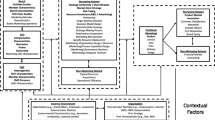Abstract
Just as Peter Drucker pointed out the importance of assessing whether a company’s “theory of business” is relevant, marketers need to consider whether the current “theory of marketing” still fits in a world of rapid change. The author examines how Drucker challenged the theory of business at financial services firm Edward Jones, helping to identify new market opportunities. For example, he urged the company to move into metropolitan areas, which now account for 60 percent of the firm’s business. The article then considers how the field of marketing needs to reexamine its own mental models. Finally, the article considers how Drucker’s seminal insights on marketing, particularly his emphasis on an interdisciplinary approach, might point the way to new approaches.
Similar content being viewed by others
References
Ackoff, R. (1979). The future of operational research is past. The Journal of the Operational Research Society, 30(1), 93–104.
Berry, L. L., & Bendapudi, N. (2003). Clueing in customers. Harvard Business Review, 81(2), 100–106.
Bianco, A. (2004). “The Vanishing Market,” Business Week (July 12):60; reporting on a survey of the fifteen largest U.S. television markets in 2003 by CNW Marketing Research, Inc.
Day, G. S. (1990). Market driven strategy. New York: The Free Press.
Drucker, P. F. (1954). The practice of management. New York: Harper & Brothers.
Drucker, P. F. (1964). Managing for results. New York: Harper & Row.
Drucker, P. F. (1973). Management: Tasks, responsibilities and practices. New York: Harper & Row.
Drucker, P. F. (1982). The Zen expressionists: Paintings of the Japanese counterculture 1600–1800, Ruth Chandler Williamson Gallery.
Drucker, P. F. (1993). SEI distinguished lecture: Peter Drucker on ‘The new organization,’ SEI Center for Advanced Studies in Management, 5, (April 7).
Drucker, P. F. (1994). The theory of the business. Harvard Business Review, 72(5), 95–104 (Sep/Oct).
Drucker, P. F. (1996). Management is not a technique. Across the Board, 33(1), (January).
Drucker, P. F. (2003). New trends in management. Executive Excellence, 20(8), 8–9.
Drucker, P. F. (2004). The way ahead. Executive Excellence, 21(5), 3 (May).
Farris, P. W., Bendle, N. T., Pfeifer, P. E., & Reibstein, D. J. (2006). Marketing Metrics 50+Metrics Every Executive Should Master. Upper Saddle River, NJ: Wharton School.
Kroft, S. (2004). “The Echo Boomers", CBS News, October 3. <http://www.cbsnews.com/stories/2004/10/01/60minutes/printable646890.shtml>
Mahajan, V., & Banga, K. (2006). The 86 percent solution. Upper Saddle River, NJ: Wharton School.
Prahalad, C. K. (2005). The fortune at the bottom of the pyramid. Upper Saddle River, NJ: Wharton School.
Sheth, J., & Sisodia, R. (Eds.) (2006). Does marketing need reform? Fresh perspectives on the future. New York: M E Sharpe.
Tapscott, D., & Williams, A. D. (2006). Wikinomics: How mass collaboration changes everything. New York: Portfolio.
Wind, Y. (2006). Challenging the mental models of marketing. In J. Sheth, & R. Sisodia (Eds.), Does Marketing Need Reform? Fresh Perspectives on the Future. New York: M E Sharpe.
Wind, Y. (2008). How To Reinvent Marketing. Sloan Management Review, Summer.
Wind, Y., & Crook, C. (2005). The power of impossible thinking. Upper Saddle River, NJ: Wharton School.
Wind, Y., & Nueno, P. (1998). The impact imperative: Closing the relevance gap of academic management research. New York: The International Academy of Management. (May).
Wind, Y., & Saaty, T. L. (1980). Marketing applications of the analytic hierarchy process. Management Science, 26(7), 641–658.
Acknowledgement
The author is grateful to John Bachmann, former Managing Partner of Edward Jones and Chair of the Drucker School Board of Visitors, and Doug Hill, former Managing Partner of Edward Jones who was the partner in charge of marketing during the time the firm worked with Peter Drucker, for their insights on their long and productive collaboration with Peter Drucker.
Author information
Authors and Affiliations
Corresponding author
Rights and permissions
About this article
Cite this article
Wind, J.Y. Rethinking marketing: Peter Drucker’s challenge. J. of the Acad. Mark. Sci. 37, 28–34 (2009). https://doi.org/10.1007/s11747-008-0106-0
Received:
Accepted:
Published:
Issue Date:
DOI: https://doi.org/10.1007/s11747-008-0106-0



